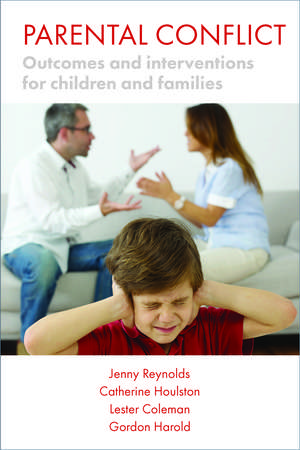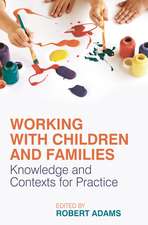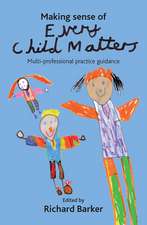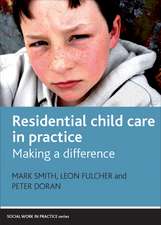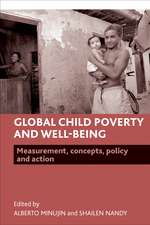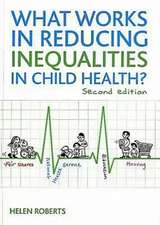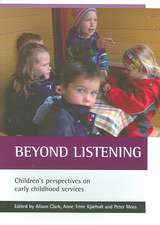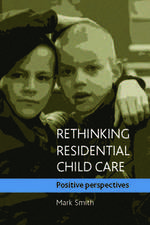Parental Conflict: Outcomes and Interventions for Children and Families: Understanding and Strengthening Relationships
Autor Jenny Reynolds, Catherine Houlston, Lester Coleman, Gordon Harolden Limba Engleză Paperback – 30 ian 2014
Researchers increasingly recognize the importance of early family experiences on children and the impact that inter-parental conflict has on child development. This book reviews recent research in order to show how children who experience high levels of inter-parental conflict are put at both an immediate psychological and physical risk and a longer-developing risk of recapitulating such behaviors. The authors examine topics such as the differences between destructive and constructive inter-parental conflict on child development, why some children are more adversely affected than others, and how conflict affects child physiology. Ultimately they provide suggestions for improving the futures of children who are experiencing challenging family environments today.
Preț: 168.60 lei
Nou
Puncte Express: 253
Preț estimativ în valută:
32.26€ • 33.77$ • 26.69£
32.26€ • 33.77$ • 26.69£
Carte disponibilă
Livrare economică 17-31 martie
Livrare express 28 februarie-06 martie pentru 20.45 lei
Preluare comenzi: 021 569.72.76
Specificații
ISBN-13: 9781447315810
ISBN-10: 1447315812
Pagini: 288
Ilustrații: 6 halftones
Dimensiuni: 152 x 229 x 11 mm
Greutate: 0.27 kg
Editura: Bristol University Press
Colecția Policy Press
Seria Understanding and Strengthening Relationships
ISBN-10: 1447315812
Pagini: 288
Ilustrații: 6 halftones
Dimensiuni: 152 x 229 x 11 mm
Greutate: 0.27 kg
Editura: Bristol University Press
Colecția Policy Press
Seria Understanding and Strengthening Relationships
Notă biografică
Jenny Reynolds is an independent researcher specializing in family relationships and an associate at OnePlusOne, where Catherine Houlston is a senior research officer and Lester Coleman is head of research. Gordon Harold is the Andrew and Virginia Rudd Chair in Psychology at the University of Sussex.
Cuprins
Foreword
Preface
1. Conflict in context
Changing family life
Introducing inter-parental conflict
Introducing child impacts
Introducing why outcomes from inter-parental conflicts differ for children
2. Understanding different types of conflict
What type of conflict matters?
Differentiating destructive and constructive conflict
What about domestic violence?
Constructive conflict
3. The impact of inter-parental conflict on children
Emotional regulation: externalising and internalising conflicts
Family and social relationships
Poor health
Sleep
Academic performance
4. How does inter-parental conflict affect children?
Inter-parental conflict and troubled family relationships
Implications for children’s emotional security and attachment
Processes that explain the negative impact of couple conflict on parenting
Emotional, cognitive and behavioural responses to conflict: the child’s perspective
Inter-parental conflict and children’s early brain development
Sensitisation: don’t children get used to fighting parents?
5. Risk and resilience: why are some children affected more than others?
Child characteristics
Family characteristics
Extra-familial characteristics
6. Review of conflict-based interventions for couples
What should conflict interventions focus on?
Are there effective conflict interventions?
Focus on parenting: parent education programmes
Parenting intervention programmes that take account of the couple relationship
Programmes that focus on at-risk groups and challenging transitions
Interventions that focus specifically on conflicts
Couples who have separated/divorced
Couples who are still together
Early intervention: relationship preparation or enhancement courses
What does the current evidence tell us?
7. Implications for practice: how to help families
When should we intervene?
Early intervention is important, but how early is early enough?
Who should interventions focus on?
What are some common components of couple interventions?
Moderating factors
Innovative ideas for conflict intervention
Conclusions
8. Conclusions and recommendations
Headline findings
How practitioners can help families in conflict
Gatekeepers to conflict interventions and further support
Promoting an early intervention approach and raising awareness
Help parents develop skills to avoid destructive conflict and to promote constructive conflict
Inform programme developers in how to customize conflict interventions
Follow-up support for parents
Focusing on children
Encouraging help seeking
How policy makers can help
The role of further research
References
Index
Preface
1. Conflict in context
Changing family life
Introducing inter-parental conflict
Introducing child impacts
Introducing why outcomes from inter-parental conflicts differ for children
2. Understanding different types of conflict
What type of conflict matters?
Differentiating destructive and constructive conflict
What about domestic violence?
Constructive conflict
3. The impact of inter-parental conflict on children
Emotional regulation: externalising and internalising conflicts
Family and social relationships
Poor health
Sleep
Academic performance
4. How does inter-parental conflict affect children?
Inter-parental conflict and troubled family relationships
Implications for children’s emotional security and attachment
Processes that explain the negative impact of couple conflict on parenting
Emotional, cognitive and behavioural responses to conflict: the child’s perspective
Inter-parental conflict and children’s early brain development
Sensitisation: don’t children get used to fighting parents?
5. Risk and resilience: why are some children affected more than others?
Child characteristics
Family characteristics
Extra-familial characteristics
6. Review of conflict-based interventions for couples
What should conflict interventions focus on?
Are there effective conflict interventions?
Focus on parenting: parent education programmes
Parenting intervention programmes that take account of the couple relationship
Programmes that focus on at-risk groups and challenging transitions
Interventions that focus specifically on conflicts
Couples who have separated/divorced
Couples who are still together
Early intervention: relationship preparation or enhancement courses
What does the current evidence tell us?
7. Implications for practice: how to help families
When should we intervene?
Early intervention is important, but how early is early enough?
Who should interventions focus on?
What are some common components of couple interventions?
Moderating factors
Innovative ideas for conflict intervention
Conclusions
8. Conclusions and recommendations
Headline findings
How practitioners can help families in conflict
Gatekeepers to conflict interventions and further support
Promoting an early intervention approach and raising awareness
Help parents develop skills to avoid destructive conflict and to promote constructive conflict
Inform programme developers in how to customize conflict interventions
Follow-up support for parents
Focusing on children
Encouraging help seeking
How policy makers can help
The role of further research
References
Index
